Top contenders for the best female football player title
On the football field, effort and talent know no gender. However, when it comes to highlighting prominent stars of women’s football, we cannot overlook great players like Marta Vieira da Silva, Birgit Prinz, or Abby Wambach. While there is ongoing debate about honoring the greatest players, each individual has left a distinct mark on fans and the professional community. Let’s explore the list of the best female football player in this article with Kingsoccertips!
Top 10 Best Female Football player of All Time
Sporting News ranks the top 10 best female football player of all time in reverse order, starting with a modern-day superstar who has consistently been among the greatest players to date.
10. Alexia Putellas (Spain)
With her current peak position and bright prospects for the future, Alexia Putellas is not only one of the greatest female footballers of all time but is also emerging as an icon of women’s football worldwide. At the age of 29, the Spanish midfielder has risen to prominence both at club and national team levels.
Putellas has been closely associated with Barcelona, where she has achieved numerous significant honors such as two UEFA Women’s Champions League titles and three runner-up finishes. Her role in Barcelona’s success has been highlighted through exceptional performances and excellent leadership abilities.

On the international stage, despite Spain’s lack of major achievements, Putellas’s important contributions have seen continuous improvement. From its debut at the Women’s World Cup in 2015 to reaching the quarter-finals in 2019, Spain has demonstrated considerable progress under her leadership.
Alongside personal achievements like winning the MVP at the SheBelieves Cup 2020 and consecutive Ballon d’Or awards in 2021 and 2022, Alexia Putellas has unequivocally solidified her position as the best female football player in the world. She is an icon not only for her achievements but also for her role in elevating the importance of women’s football, making her one of the most influential women in the modern football world.
9. Sun Wen (China)
In her 16-year career with the Chinese national team, Sun was truly the first global icon of Asian women’s football. Her achievements elevated her to iconic status during the early days of women’s football globally.
Making her international debut in 1990 at the age of 17, Sun was one of three players to appear in all 15 of China’s initial matches at the Women’s World Cup, culminating in a final appearance in 1999, where China lost to the host United States in a penalty shootout. Despite the heartbreaking defeat, Sun was awarded the Golden Ball as the tournament’s best player, having been the tournament’s top scorer with 7 goals.
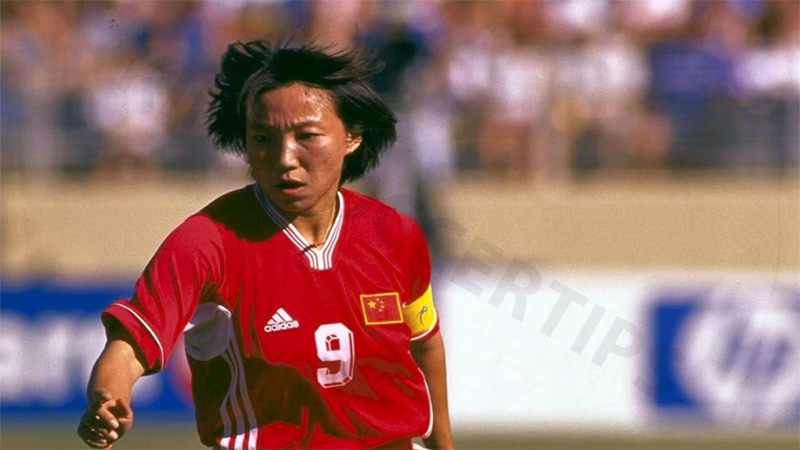
Towards the end of her career, Sun was nominated for FIFA Women’s World Player of the Year in 2001 and 2002, finishing second and third, respectively. As a testament to her career achievements, she was also nominated for FIFA’s Women’s Player of the Century in 2002, where she finished second behind Michelle Akers, further emphasizing her status as the best female football player in history.
8. Carli Lloyd (USA)
Much of Carli Lloyd’s career went unnoticed while she played among a team of exceptional players. However, despite all that has been said and done, Lloyd has remained one of the most consistently performing players in the history of the world’s most successful national team. The New Jersey-born star has scored 134 international goals in 316 appearances. Even though those goals alone were enough to put her on the all-time scoring list, she has always been there to deliver crucial goals when her team needed them most.
Lloyd has been at the forefront and the centerpiece of some of the United States’ most iconic victories in women’s soccer. These include scoring the winning goals in both the 2008 and 2012 Olympic gold medal matches, as well as her thrilling hat-trick in the 2015 Women’s World Cup final. In that final, she emerged from midfield and was subsequently nominated for that year’s Puskás Award. Her 2015 performance earned her the Golden Ball as the tournament’s best player.
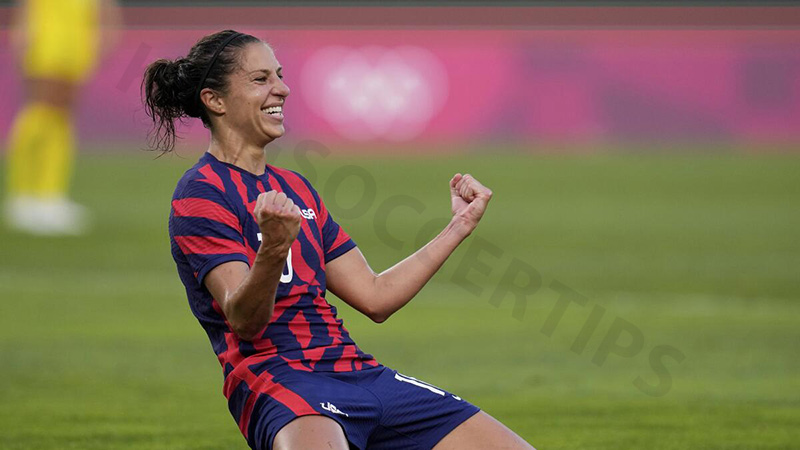
She was nominated for the FIFA Women’s World Player of the Year award in 2012. She won the award in 2015 and 2016 and was nominated again in 2017. Her club career has been less decorated. She reached the MAC Hermann Cup final while playing for Rutgers and won the 2016-17 FA Women’s Cup with Manchester City. However, this has not diminished her enormous stature in the context of United States international football.
7. Homare Sawa (Japan)
Japan’s legend, Homare Sawa, is largely regarded as the greatest female Asian footballer of all time, with career accolades to bolster that claim at both individual and team levels. She won the award in 2015 and 2016 and was nominated again in 2017, further solidifying her status as the best female football player of her generation. While her most notable career achievements are her goals, she was also a spectacular midfielder.
Making her international debut at age 15 in 1993, she became one of the most consistently present players in FIFA Women’s World Cup history, appearing in six FIFA tournaments during her career- the second-most of all time.
Sawa was central to Japan’s greatest performance on the women’s football stage, winning the 2011 Women’s World Cup in one of the sport’s finest matches. Japan defeated the United States on penalties after Sawa’s equalizer in the 117th minute provided a lifeline in the shootout. She was the tournament’s top scorer with 5 goals and subsequently won the FIFA Women’s Player of the Year award in 2011.
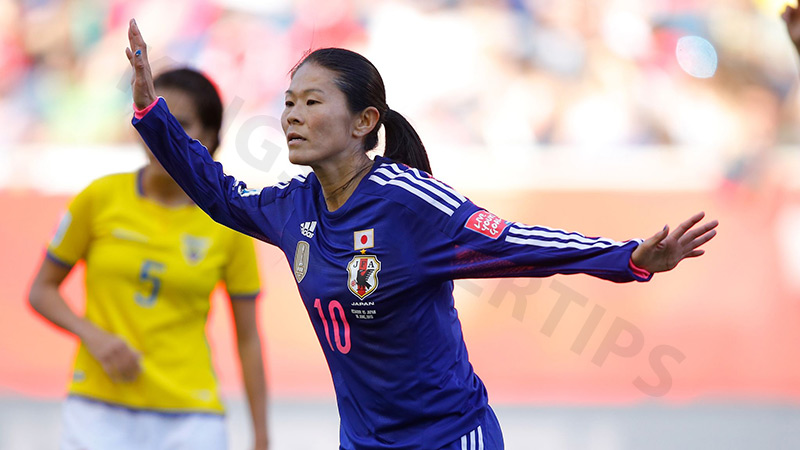
The following year, she helped Japan replicate that success with a silver medal at the 2012 Olympics. This achievement further solidified her reputation as the best female football player in the world. After a brief retirement, she returned to participate in the 2015 Women’s World Cup, where she once again led her team to the final. They finished third after losing to the United States, a result that provided a sense of redemption. At the club level, Sawa won 11 Japanese Women’s National League titles with Yomiuri/Nippon TV Beleza and INAC Kobe Leonessa, solidifying her position not only in Asian women’s football but also in major tournaments globally.
6. Michelle Akers (USA)
The career of US legend Michelle Akers began before women’s football had fully developed, which meant she did not fully enjoy the fame and awards she deserved. However, this does not detract from her place among the greatest players in sports history.
Her most notable achievement was her impressive 10-goal performance in the inaugural 1991 Women’s World Cup, a total that helped her win the Golden Boot and remains the highest goal tally ever scored in a FIFA tournament. Half of those goals came in one match, where she scored 5 in a 7-0 quarter-final victory over Chinese Taipei. This remains a record for the most goals scored in a single match in the Women’s World Cup, a record only equaled once by Alex Morgan in 2019.
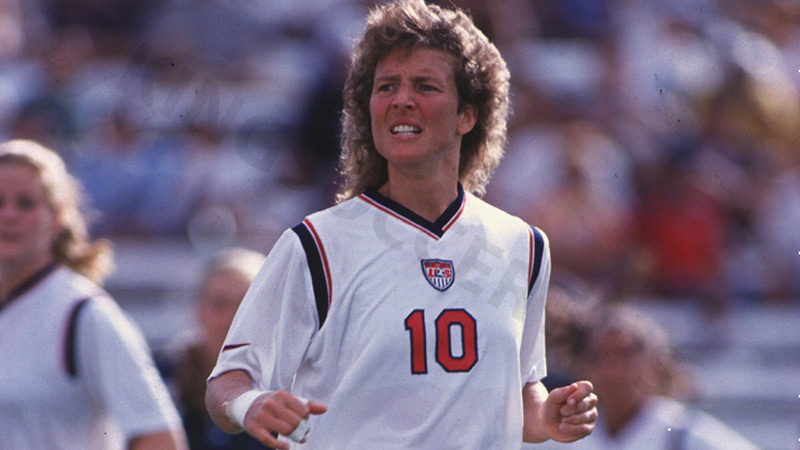
However, that wasn’t Akers’s first highlight in her career. She is known for becoming the first female recipient of the MAC Hermann Trophy for outstanding collegiate play, winning the prestigious award in 1988 while at UCF. This early recognition set the stage for her to become the best female football player in the world. She continued to be recognized for her achievements and went on to secure Olympic gold in 1996 and a second Women’s World Cup title in 1999. Had it not been for a knee injury during that final World Cup, she might have had an even longer career. Instead, she was forced to retire.
Honored as FIFA Women’s Player of the Century in 2002, Akers’s position as one of the greatest players of all time was cemented.
5. Christine Sinclair (Canada)
While Sinclair’s career has largely been about striving to elevate Canada to the top tier of women’s football, her position as the all-time leading goal scorer in international football history cannot be denied. At age 40 this year, Sinclair will enter the 2023 Women’s World Cup aiming to add another chapter to her illustrious career.
Indeed, Sinclair’s 190 international goals stand out as the most notable highlight of her career, but she’s not merely a goal scorer. Sinclair has been a versatile player throughout her career, capable of playing both as a midfielder and a number 10.
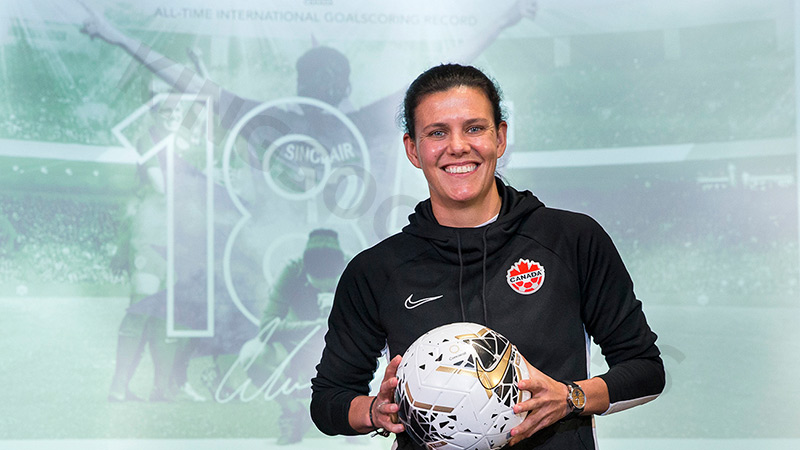
Sinclair’s career burst onto the scene early when she scored 23 goals as a freshman at the University of Portland, leading all freshmen nationwide. She would lead Portland to two NCAA titles in her collegiate career, setting the stage for her international achievements, highlighted by the 2021 Olympic gold medal, easily Canada’s greatest achievement in women’s football. She was also instrumental in Canada’s fourth-place finish at the 2003 Women’s World Cup, still the nation’s best result in the tournament to date. With titles, goals, records, and incredible longevity, Sinclair has undoubtedly earned her place as the best female football player in history.
4. Abby Wambach (USA)
As the all-time leading goal scorer for the United States and second in international football history, Wambach carved out a near-top spot on this list. Among her 184 international goals are some of the most famous and iconic in U.S. history, including the equalizer in the 122nd minute against Brazil in the 2011 Women’s World Cup quarter-finals, which remains one of the most memorable goals in the tournament’s history.
During her peak years, she was nominated for four FIFA Women’s World Player of the Year awards, winning once in 2012. That year, she topped the list, even though she didn’t play for a club team, only securing international achievements.
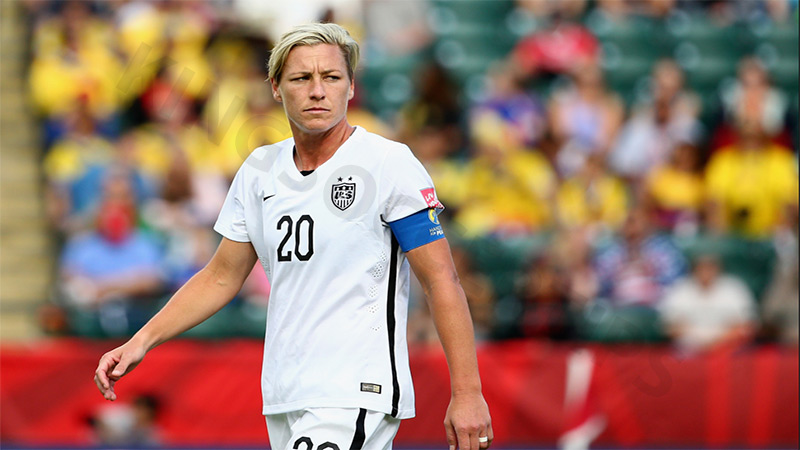
Wambach’s bulldozing style made her a force in the box, capable of scoring in any manner, but she was also a beast in the air and an expert at off-the-ball movement. Her prowess solidified her reputation as the best female football players, a title that she earned throughout her career. It paid dividends for her—and her teams—at every stage, helping the Florida Gators win their first NCAA championship in 1998 and continuing to contribute to winning a Women’s World Cup title and two Olympic gold medals. At the individual level, she earned the Silver Ball for the second-best player at the 2011 World Cup and was the first footballer to win the AP Female Athlete of the Year, along with World Player of the Year honors. She is a true legend of the game in front of the goal.
3. Birgit Prinz (Germany)
German forward Birgit Prinz could be the most talented goal scorer the game has ever seen, and although her peak career form did not endure as long as Abby Wambach or Christine Sinclair, her dominance during her prime was unlike any forward in the game’s history. Prinz completely dominated wherever she went until retiring at age 34.
Prinz ended her club career with 282 goals in 282 matches, but her international accomplishments with the German national team are what she is most renowned for. She secured two Women’s World Cup titles in 2003 and 2007, notably defeating the host nation, the United States, 3-0 in the semi-finals in 2003, one of the nation’s greatest results. She won three consecutive FIFA Women’s World Player of the Year awards from 2003 to 2005 and finished second only to Marta in four consecutive years from 2007 to 2010.
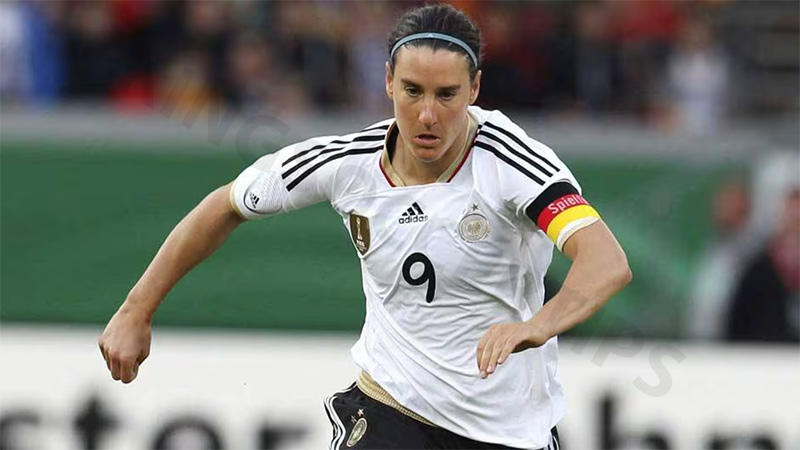
At the club level, Prinz collected trophies wherever she went. As the best female football player, she won two Bundesliga titles and two German Cup titles with Frankfurt in the mid-1990s, and then, after moving to a different club in 1998, she continued to dominate domestically with seven Bundesliga titles and eight German Cup titles during a period of complete domestic supremacy. Prinz was a four-time top scorer in the league, with three of those titles coming from title-winning seasons. As if that wasn’t enough, she took a two-year hiatus from Germany to play in the Women’s United Soccer Association (WUSA) with the Washington Freedom, winning the WUSA championship in 2002. Few athletes in the history of this sport have a more impressive trophy cabinet than the German legend.
2. Mia Hamm (USA)
Mia Hamm was considered the greatest female soccer player in U.S. history and was not only a shining figure on the field but also an icon of leadership and inspiration for women in sports. With 305 national team contributions, including 158 goals and 147 assists, Hamm built a legendary career starting at the age of just 15.
Hamm’s career accelerated when she scored the decisive goal in the opening match of the 1991 Women’s World Cup, instantly becoming a focal point of attention. With four NCAA championships and two World Cup victories, along with two Olympic gold medals, Hamm was not just a superb player but also a symbol of resilience and success for women in sports.
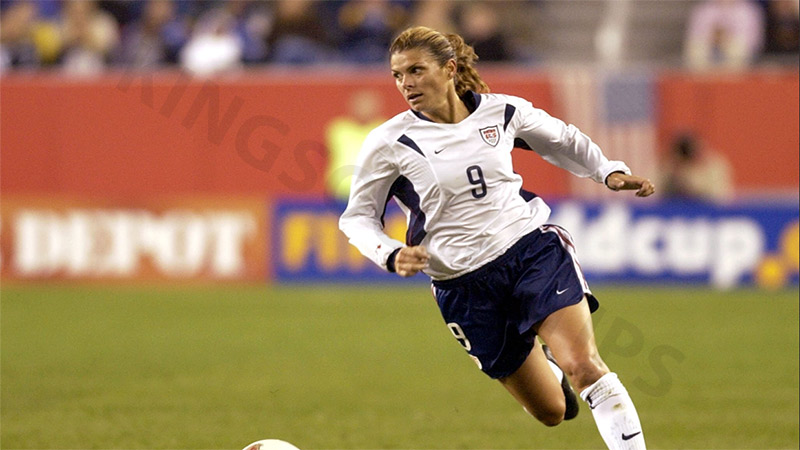
Beyond her achievements, Hamm was recognized with prestigious awards such as the FIFA Women’s World Player of the Year twice in 2001 and 2002. With all these achievements, she transcended the boundaries of women’s soccer and became one of the most prominent female athletes of all time.
However, behind her achievements on the field, Hamm also had a profound impact on the women’s sports community, particularly in the USA. She inspired and motivated generations of women, contributing significantly to the development and promotion of women’s soccer in the country. By standing up and leading, Mia Hamm demonstrated that there are no limits that cannot be surpassed with passion and effort.
1. Marta (Brazil)
The best female football player in history is Brazilian legend Marta. Despite never winning the Women’s World Cup, finishing as runners-up in 2007, she still shone on the biggest FIFA stage, becoming the all-time leading scorer in Women’s World Cup history with 17 goals in her career.
She earned six FIFA Women’s World Player of the Year awards in her career, including an astonishing five consecutive years from 2006 to 2010, establishing her dominance during the peak of her career. She was nearly a one-woman show in her quest for global glory but couldn’t overcome the hurdles to win the Women’s World Cup or secure two Olympic silver medals.
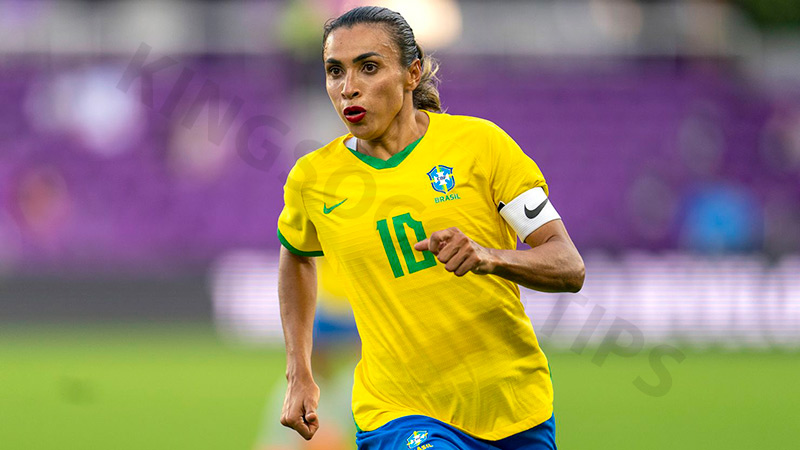
However, those team failures did not diminish her claim to this throne. She showcased her talent from a young age by winning the Golden Ball for the best player at the 2004 FIFA U-19 Women’s World Championship, despite Brazil only finishing fourth. She continued to fulfill her great potential. She won the Golden Ball in 2007, finishing as the top scorer of the competition.
At the club level, Marta, now 37, played most of her career in the USA, dominating for three years in the now-defunct WPS with the Western New York Flash, winning the championship in 2011. She played for several years in Sweden before returning to the USA to play for Orlando Pride in 2015. She is currently leading in appearances and goals in her club career.
Conclusion
In the realm of women’s football, several iconic players have left an indelible mark on the sport, each contributing uniquely to its legacy. From Marta’s unrivaled prowess and six FIFA Women’s World Player of the Year awards to Birgit Prinz’s domination on the international stage and Mia Hamm’s inspirational leadership, these athletes have redefined what it means to excel in football. Whether through sheer goal-scoring ability, leadership qualities, or transformative impact on and off the field, each of these players has solidified her place as the best female football player in history. Their achievements not only showcase their brilliance but also inspire generations of aspiring athletes worldwide, continuing to elevate the standard of women’s football globally. As the sport evolves, its legacies serve as a testament to the enduring power of dedication, skill, and passion in football.
See more: Top 10 female tennis players of all time
